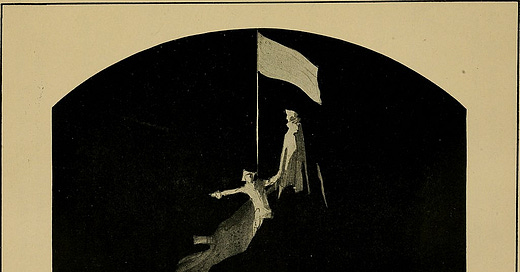What a week of dignity and delight.
What a moment on Sunday when the news spread in a great wave of donor dollars and reverence (and glee!) that President Joe Biden was dropping out of the race and endorsing his Vice President Kamala [that’s Comma-la, please] Harris in his stead. From his letter:
It has been the greatest honor of my life to serve as your President. And while it has been my intention to seek reelection, I believe it is in the best interest of my party and the country for me to stand down and to focus solely on fulfilling my duties as President for the remainder of my term.
Key to me in this, and what I’ll explore here, was this term “stand down.” This isn’t back out, sit down, give up. It’s stand down, kind of oxymoronic, with a connotation of rising at the same time as falling, lifting while lowering. There’s no defeat here but strength in this expression, with a military flavor from a history that started in wartime of the early 1900s. His followers weren’t cheering to see him go, but to see him meet this moment of necessary transition so honorably.
Stand down, according to Merriam-Webster dictionary:
1: to leave the witness stand
2: (chiefly British) to go off duty or to withdraw from a contest, a position of leadership, or a state of alert or readiness; to remove from active duty
With the example cited: “In December of 1944, it was judged safe to stand down the Home Guard … after four and a half years of guarding Britain against invasion.”—Anthony Bailey
Or, with more color and history from Word Detective:
“Stand down” is a specialized use of the verb “to stand,” which, as you might imagine, is quite old and has developed dozens of senses. “Stand” first appeared in Old English (as “standan”) from Germanic roots, and means in its most basic sense, as the Oxford English Dictionary defines it regarding people or animals, “to assume or maintain an erect attitude on one’s feet (with distinction, expressed or understood, from sit, lie, kneel, etc.)” or, of things, “to be in an upright position with the lower part resting on or fixed in the ground or other support; opposed to lie.” In addition to various literal uses, “stand” has acquired a wide range of figurative senses, from “to stand by” someone (be faithful and supportive) to “stand” in the sense of “bear, tolerate” (“I could not stand the music in the elevator, so I took the stairs”).
“Stand down” is one of several specifically military uses of “stand” that include “to stand to one’s arms,” meaning “to maintain one’s position in the face of an attack” (the source of the idiom “to stick to your guns,” meaning “to not give in” in an argument, etc.), as well as “to stand to arms,” meaning to assume combat readiness and prepare for action. “To stand down” is the opposite of “to stand to arms,” and means to go off duty or relax from a state of readiness (“‘Stand-down’ was the corresponding order at the end of the Danger Period, used in like manner as an expression for a definite point of time,” 1925). The “down” in “stand down” doesn’t mean literally taking a seat, any more than the command “at ease” means to lounge on the nearest couch, but the contrast is to “on duty” status and alert readiness. “Stand down” first appeared in print in 1919, just after World War I, so we can assume that the term originated in that conflict.
Most uses of “stand down” I’ve found in print are in the military sense, but it is used occasionally in the sense of “to back off” or “to stop an aggressive action” (“Medical marijuana protesters urge feds to stand down,” 10/11). Here in the US, “stand down” seems to be commonly used as a name of community programs and public-awareness campaigns designed to help military veterans facing endemic unemployment and homelessness (“Stand Down gives veterans chance to get help, give back,” 10/13/11).
The Stand Down program borrows the term for taking a military-style break to help restore the dignity and meet the needs of homeless veterans, starting in San Diego in 1988 and growing to 190 events across the country annually. From the National Coalition for Homeless Veterans:
In times of war, exhausted combat units requiring time to rest and recover were removed from the battlefields to a place of relative security and safety. At secure base camp areas, troops were able to take care of personal hygiene, get clean uniforms, enjoy warm meals, receive medical and dental care, mail and receive letters, and enjoy the camaraderie of friends in a safe environment.
Today, Stand Down refers to a grassroots, community-based intervention program designed to help the nation’s estimated 107,000 homeless veterans on any given night “combat” life on the streets. Homeless veterans are brought together in a single location for one to three days and are provided access to the community resources needed to begin addressing their individual problems and rebuilding their lives. In the military, Stand Down afforded battle-weary soldiers the opportunity to renew their spirit, health and overall sense of well-being. Today’s Stand Down affords the same opportunity to homeless veterans.
Stand Down in popular culture can connote a fight, and comes with a playlist:
There’s the Irish Stand Down, a form of bare-knuckle boxing popular in the Irish American ghettos of the late 1800s, “where the aspect of maneuvering around the ring is removed, leaving only the less nuanced aspects of punching and ‘taking’ punches,” according to Boxing.Fandom.com.
Or, “Stand Down,” a 2013 song by Little Mix from Salute
Daddy said, “You get one chance in life”
Daddy said, “You get one chance in life”
Let me start it by telling you something
I think there’s one thing you should know
We ain’t playin’ no games, this ain’t no playground
It’s time to drop your sticks and stones
’Cause I’ve been chasing dreams since I took my first sleep
“Stand Down, Margaret,” a song by Elvis Costello and the Attractions on the 1983 album Punch the Clock, and “Whine & Grine/Stand Down Margaret,” a song by The Beat from the 1980 album I Just Can’t Stop It
Stand Down Soldier, a 2014 film directed by Jeryl Prescott, summed up here on IMDB.com:
After Sergeant Stacy Armstrong returns from three deployments with PTSD, Jesse and Stacy are determined to save their twenty-year marriage from being another casualty of war. Infidelity, addiction, and a tragic accident test the couple’s commitment as Jesse struggles to keep Stacy and their marriage alive.
What a moment on Monday, when Harris was speaking to her campaign headquarters crew, with her mentor Biden, listening in, who said with fatherly kindness, “I’m watching you, kid. I love you.”
And what a moment on Wednesday, when the President addressed the nation directly in something of a send-off speech from his Resolute Desk in the Oval Office, surrounded by his family—resolute in his resolve to be selfless.
I revere this office, but I love my country more. It's been the honor of my life to serve as your president. But in the defense of democracy, which is at stake, I think it’s more important than any title. I draw strength and I find joy in working for the American people, but this sacred task of perfecting our union is not about me. It’s about you, your families, your futures. It’s about we the people, and we can never forget that. And I never have. I’ve made it clear that I believe America is at an inflection point, one of those rare moments in history when the decisions we make now will determine our fate of our nation and the world for decades to come… So I’ve decided the best way forward is to pass the torch to a new generation. That’s the best way to unite our nation. There is a time and a place for long years of experience in public life, but there’s also a time and a place for new voices, fresh voices, yes, younger voices, and that time and place is now.
“Passing the torch,” for those in tune with such speeches, may resonant as a direct lift from John F. Kennedy’s inaugural address, 1961. He was the youngest man elected to the office at the age of 43, and the first Catholic. Obama comes in at second youngest at 47 years upon his election, and the first black man to hold the highest office.
JFK:
We observe today not a victory of party but a celebration of freedom—symbolizing an end as well as a beginning—signifying renewal as well as change… Let the word go forth from this time and place, to friend and foe alike, that the torch has been passed to a new generation of Americans.

The phrase “graceful exit” that also keeps coming to my mind through this week is often quoted from Pulitzer Prize winning writer Ellen Goodman’s parting column after 46 years, “Letting go” in 2010. The scene she sets of then vs. now: “Looking backward and forward. I began writing my column when my daughter was 7 and I leave as my grandson turns 7. I began writing about Gerald Ford and end writing about Barack Obama. I began on a typewriter, transmitting columns on a Xerox telecopier. Now I have a MacBook on my desk and an iPhone in my pocket.” And, the real sign of the times, the wisdom of knowing it’s time to go:
There’s a trick to the Graceful Exit. It begins with the vision to recognize when a job, a life stage, a relationship is over—and to let go. It means leaving what’s over without denying its validity or its past importance in our lives.
It involves a sense of future, a belief that every exit line is an entry, that we are moving on rather than out.
The trick of retiring well may be the trick of living well. It’s hard to recognize that life isn’t a holding action, but a process. It’s hard to learn that we don’t leave the best parts of ourselves behind, back in the dugout or the office. We own what we learned back there. The experiences and the growth are grafted onto our lives. And when we exit, we can take ourselves along—quite gracefully.
Can you point to a Graceful Exit or noble Torch-Passing you’ve witnessed, learned about, or experienced? A commendable Standing Down?






I am extremely grateful for this past week.
Perfect piece for this moment. Biden doing what he did, the way he did it, and the energy it created when Kamala took the baton... I've never seen anything like it in my life. I don't think any of us have. These last string of weeks have been shattering, and inspiring, and exhausting. I hope things calm down a little so I can sleep and recover a bit.